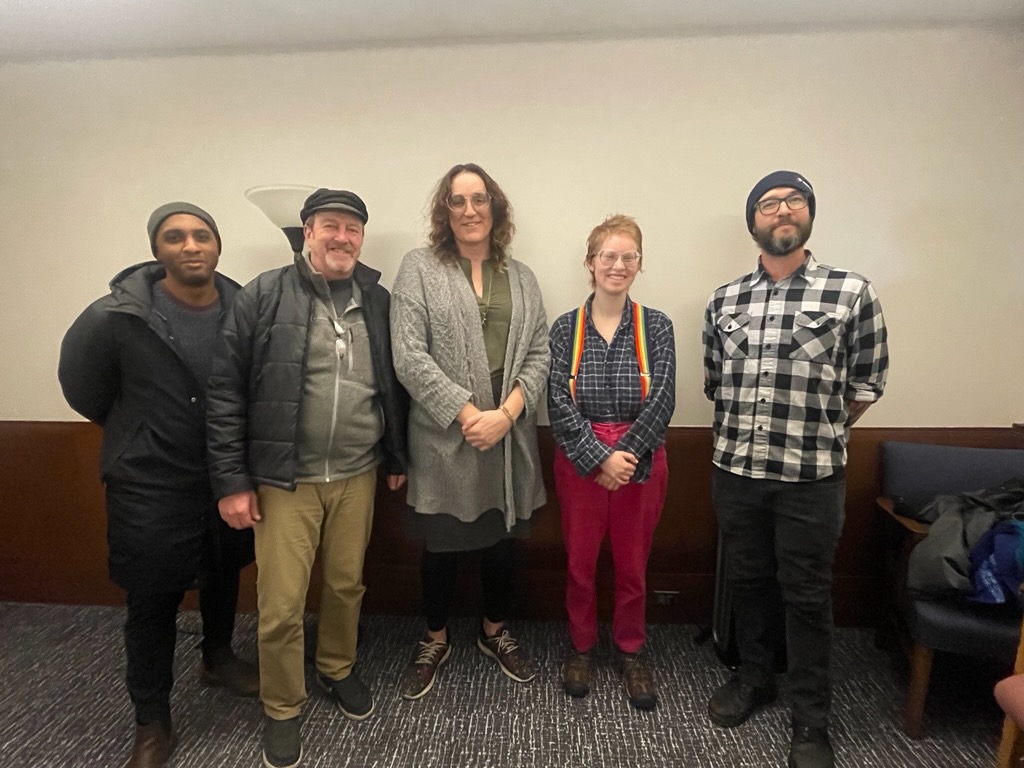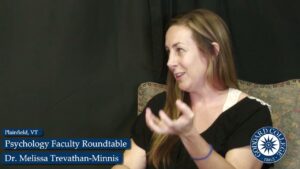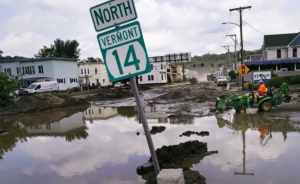
was tied up with Goddard College and that that was what life was about.”
Dustin Byerly (BA RUP ’01) had the honor of sitting down with Caleb Pitkin (BA ’80), grandson of Founding President Tim Pitkin, at his home to discuss the long history of the Pitkin family and his own experience at Goddard College.
DB: How did you find Goddard?
CP: My family has been involved with Goddard for a very long time. My mother, father and uncle all went to school and worked at the College and so I spent a lot of time on campus as a young child. Growing up it seemed to me that our whole family was tied up with Goddard College and that that was what life was about.
DB: Why did you choose Goddard?
CP: Earlier, I had been studying history and also plant and soil science at UVM but the classes didn’t really relate to what I was interested in doing, and seemed to involve a lot of seemingly pointless memorization and so I quit. I ended up working at Goddard for two semesters in the Maintenance department, which was a great experience. I really got to know the students and the faculty and decided to enroll.
DB: What did you study at Goddard?
CP: During my five semesters at Goddard, my classes were predominantly related to natural resources, energy, their uses, and their influence on rural communities. I was interested in learning more about the means of food production and timber production as a way of supporting myself.
This eventually grew into a broader interest in both the history and future of human interaction with the local environment – including energy production, and into a more general interest in the stewardship of resources on both the personal and community levels.
DB: What was your experience at Goddard like?
CP: I enrolled for one of my semesters in a summer session at the Institute for Social Ecology. Because I was living at home on the farm, I was able to apply most of what I was learning almost immediately to what I was doing for work and sustenance. There was a level of integration to it that I hadn’t experienced before.
I had a great time getting my degree and that was the first time I really understood the value of what Goddard was doing educationally… It’s the kind of school where you get out of it what you put into it.
DB: Did your Goddard education help you in your life/career?
CP: I have made my living doing mostly the kinds of things I studied at Goddard. I have been farming to some degree since about 1980, variously as a sugarmaker, beef and hay producer, dairy producer, owner of a fruit tree nursery with my wife and her family, and occasional logging in our woodlot – sometimes at a profit.
I have also been in building construction and restoration about half time for the past ten years. My community service includes serving on both the local and regional planning commissions, chairing the select board in Cabot, serving a term in the Vermont House, serving as director of the Twin Valley Senior Center, compiling some photographic histories of Marshfield and Cabot, and things of that sort.
DB: Do you have any memories of Tim from your childhood?
CP: He was a good grandfather, he would sugar with us and do things with us. He always worked with us, he never played. The gifts he gave us were things like axes, hammers, and almost never a new gift. One Christmas he brought this big old leather suitcase, dropped it on the floor, and said Merry Christmas. We opened it up and it was full of blocks, like you would buy, but they were scraps that he had taken the time to sand down, which was a bit of a let down, but if you combined it with all the tools he had given us… he led us down the road to work.
DB: Can you share with me any stories that illustrate the type of leader your grandfather was?
CP: Well, Community Meeting used to take place in the dining hall. The Community had voted to put in a cigarette machine in the entrance to the dining hall. I used to buy cigarettes there as a kid. All you had to do was drop in 40 cents. One day it disappeared. Well, somebody investigated and asked Tim who let them know he had gotten rid of it. The student said, well the community voted to have a cigarette machine, to which Tim replied, “My College, no cigarette machine.”
DB: Do you have any memories or stories from your time at Goddard that stand out to you?
CB: As a child, around 1966, before Northwood campus was built there were just too many students and so for two years the College housed students in the community. We always had 1-2 students staying with us during this time. I can remember the Goddard College School bus picking them up every morning and dropping them off again at night.
DB: Your daughter recently graduated from Goddard. How did you feel about her going to Goddard?
CP: I was really pleased that she did that. Not just because it was for her but because she continued in the family tradition.
DB: Are you currently involved with the College?
CP: I am a member of the Central Vermont Arts (CVA) Organization which formed as a result of conversations that were taking place between the local arts community and Goddard College in 2010. CVA developed out of a realization among local arts organizations that there was much to be gained by cooperating on the development of more studio, rehearsal, and performance space in the area, and by working together on other common interests. Goddard’s interest is served by creating tangible links to the local community, and Goddard’s participation has been invaluable in setting up and sustaining the organization. It is a spirited and talented group.
DB: How do you feel about where Goddard is today and where it might go in the future?
CP: Well, I don’t think the College is in a different place then Tim would want it to be if he were still here. He tended to be 20 years ahead of his time. I think the future of education is not going to be residential. I don’t see how it could be. It’s not a sustainable model. It’s too expensive and it doesn’t really fit the reality of communication any more.
There’s so much more availability in a non-residential educational model. I mean to be engaged in the world, which is what they tried to set up at Goddard as a residential model. Back then, there was no electronic communication, internet, but they to integrate students into the community and to bring outside interests onto campus, reaching out in ways that are common place today but were not common at that time.
From 1940-1960 it wasn’t easy to get around and so the College had to be residential. I think if Tim were alive this is where he would want it to go. Goddard’s goal is to create a new model of education, where people are assisted in learning by an institution but still completely involved in their real lives.







